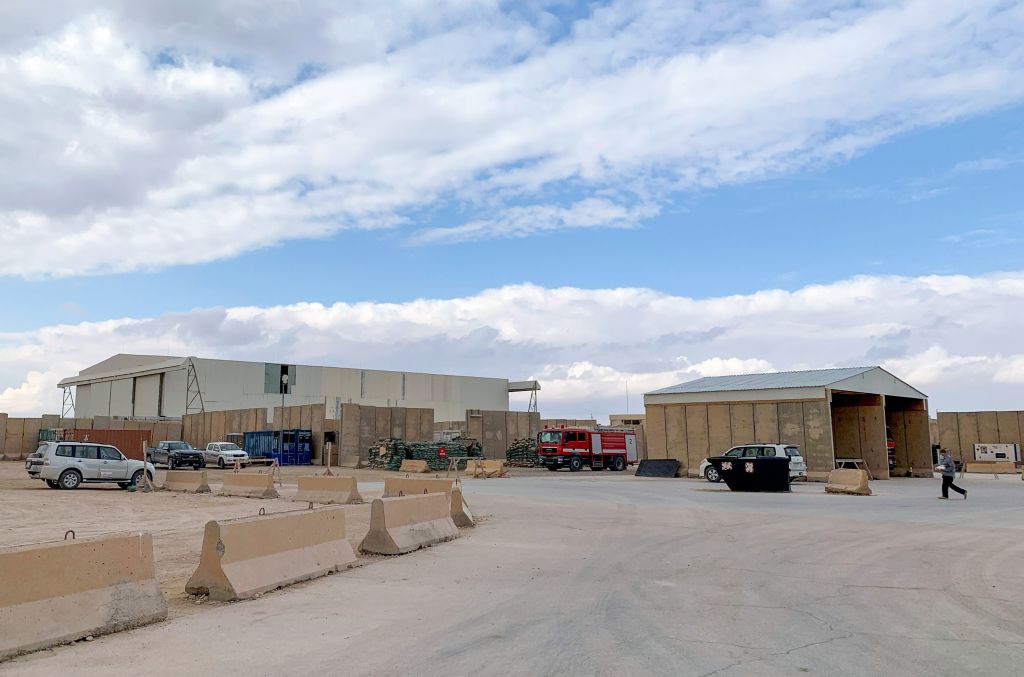U.S. commander: Iranian missile attack designed to 'inflict as many casualties as possible'


A free daily email with the biggest news stories of the day – and the best features from TheWeek.com
You are now subscribed
Your newsletter sign-up was successful
U.S. commanders at the Ain al-Asad air base in western Iraq do not think that last week's attacks by Iran were only meant to scare people.
"These were designed and organized to inflict as many casualties as possible," Lt. Col Tim Garland, Commander of Task Force Jazeera, told The Washington Post. Iran launched more than a dozen ballistic missiles, targeting al-Asad and a second base in northern Iraq. The bases house U.S. troops, and were already on high alert after Iran promised to exact revenge for President Trump authorizing an airstrike that killed Iranian Maj. Gen. Qassem Soleimani.
The base was told late Tuesday that it should expect an attack from Iran, and went into lockdown. Troops moved into underground bunkers and shelters, while some remained outside to man the perimeter, due to fears there could be also be a ground assault. The strikes came in waves, the Post reports, with up to 15 minutes between each one, and troops felt the shock waves in the air. Two soldiers in a tower were thrown through a window, commanders said, and ultimately several dozen troops were treated for concussion.
The Week
Escape your echo chamber. Get the facts behind the news, plus analysis from multiple perspectives.

Sign up for The Week's Free Newsletters
From our morning news briefing to a weekly Good News Newsletter, get the best of The Week delivered directly to your inbox.
From our morning news briefing to a weekly Good News Newsletter, get the best of The Week delivered directly to your inbox.
The barrage lasted more than 90 minutes, and when day broke, officials were able to fully assess the damage. Prefabricated buildings were mangled and living quarters and a helicopter launch site were damaged. There were no deaths, and Lt. Col. Staci Coleman told the Post it was "miraculous" that no one was seriously injured. Read more at The Washington Post.
A free daily email with the biggest news stories of the day – and the best features from TheWeek.com
Catherine Garcia has worked as a senior writer at The Week since 2014. Her writing and reporting have appeared in Entertainment Weekly, The New York Times, Wirecutter, NBC News and "The Book of Jezebel," among others. She's a graduate of the University of Redlands and the Columbia University Graduate School of Journalism.
-
 The Epstein files: glimpses of a deeply disturbing world
The Epstein files: glimpses of a deeply disturbing worldIn the Spotlight Trove of released documents paint a picture of depravity and privilege in which men hold the cards, and women are powerless or peripheral
-
 Jeff Bezos: cutting the legs off The Washington Post
Jeff Bezos: cutting the legs off The Washington PostIn the Spotlight A stalwart of American journalism is a shadow of itself after swingeing cuts by its billionaire owner
-
 5 blacked out cartoons about the Epstein file redactions
5 blacked out cartoons about the Epstein file redactionsCartoons Artists take on hidden identities, a censored presidential seal, and more
-
 2 MLB pitchers charged with rigging throws for bets
2 MLB pitchers charged with rigging throws for betsSpeed Read Cleveland Guardians pitchers Emmanuel Clase and Luis Ortiz have been indicted
-
 FBI nabs dozens in alleged NBA gambling ring
FBI nabs dozens in alleged NBA gambling ringSpeed Read Portland Trail Blazers head coach Chauncey Billups and Miami Heat guard Terry Rozier are among 34 people indicted in connection with federal gambling investigations
-
 Trump orders NFL team to change name, or else
Trump orders NFL team to change name, or elseSpeed Read The president wants the Washington Commanders to change its name back to the 'Redskins'
-
 Thunder beat Pacers to clinch NBA Finals
Thunder beat Pacers to clinch NBA FinalsSpeed Read Oklahoma City Thunder beat the Indiana Pacers in Game 7 of the NBA Finals
-
 MLB lifts ban on Pete Rose, other dead players
MLB lifts ban on Pete Rose, other dead playersspeed read 16 deceased players banned for gambling and other scandals can now be inducted into the Baseball Hall of Fame
-
 Canada beats US in charged 4 Nations hockey final
Canada beats US in charged 4 Nations hockey finalSpeed Read 'You can't take our country — and you can't take our game,' Prime Minister Justin Trudeau posted after the game
-
 Eagles trounce Chiefs in Super Bowl LIX
Eagles trounce Chiefs in Super Bowl LIXspeed read The Philadelphia Eagles beat the Kansas City Chiefs 40-22
-
 Indian teen is youngest world chess champion
Indian teen is youngest world chess championSpeed Read Gukesh Dommaraju, 18, unseated China's Ding Liren
